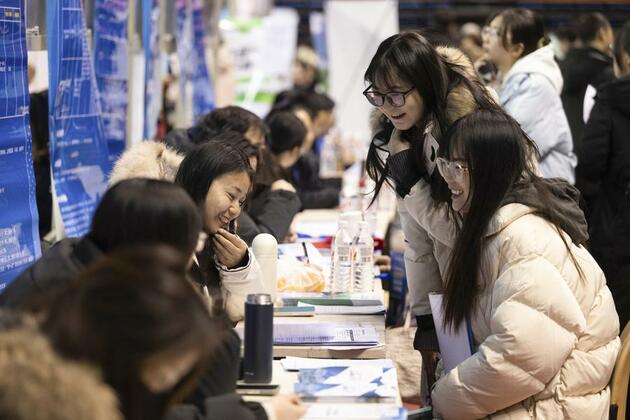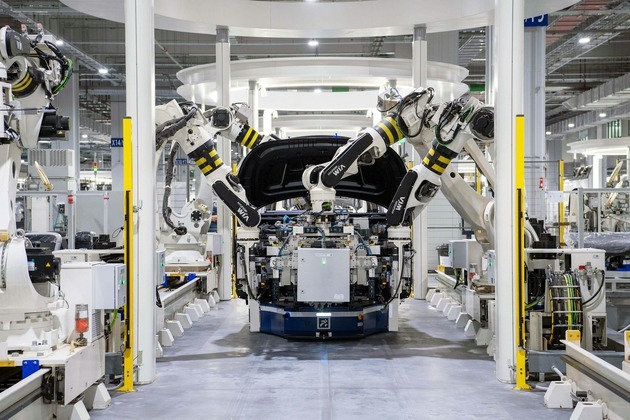China taps policy tools, emerging industries to unlock job market potential
Xinhua
12 Jun 2025, 06:15 GMT+10

BEIJING, June 12 (Xinhua) -- As part of its broader strategy to ensure high-quality and sufficient employment, China is combining fiscal support, targeted incentives and the rise of emerging industries to drive employment growth.
Recent official data indicate that China's job market remains broadly stable. The surveyed urban unemployment rate edged down to 5.1 percent in April from 5.2 percent in March, maintaining an average of 5.2 percent in the first four months of 2025.
Fu Linghui, spokesperson for the National Bureau of Statistics, credited this steady trend to the country's improving industrial performance and expanding new growth drivers, along with strengthened assistance for key labor groups.
Recognizing employment as a strategic priority, China's leadership reaffirmed job stability as a top policy goal at a tone-setting meeting of the Political Bureau of the Communist Party of China Central Committee held in April 2025.
As part of these coordinated efforts, multiple government authorities on the same day jointly unveiled measures in a circular aimed at bolstering employment among 2025 college graduates and young jobseekers.
"College graduates and other youths are valuable human resources," the circular stated, urging maximum efforts to support their employment.
Organizations that employ 2025 graduates, graduates unemployed within the first two years after leaving school or registered unemployed youth aged 16-24, are eligible for a one-off job expansion subsidy, according to the circular. This policy will be in effect until Dec. 31, 2025.
Complementing these youth-focused measures, authorities have extended broader financial support to companies aiming to preserve existing jobs. Key unemployment insurance relief policies, which help companies retain employees and support workers in upgrading their skills, have been extended through the end of 2025.
These supportive policies coincide with robust demand growth in China's high-tech industries. Notably, industry data highlight significant increases in recruitment activity in fields like industrial automation and digital technologies in the first quarter of 2025.
Data from Zhaopin.com show that vacancies for mechanical and automation engineers in the industrial automation sector had jumped by 40 percent and 10 percent in this period, respectively, while those requiring algorithm engineers and machine learning specialists rose by 44 percent and 18 percent, respectively, reflecting the increasing role of technology-driven growth.
This momentum is echoed by major Chinese enterprises, including tech giants and manufacturing firms, which have recently unveiled ambitious recruitment plans.
Tencent, for instance, announced its largest-ever employment initiative, creating 28,000 internships over three years, many with the prospect of full-time conversion. As of early March this year, the company had employed over 55,000 people -- with technology roles accounting for 73 percent of total staff.
Similarly, Alibaba opened over 3,000 roles in its 2026 spring campus recruitment round, nearly half of which are in AI-related fields. Midea Group, a leading home appliance manufacturer, plans to provide more than 2,000 positions through campus recruitment in 2025.
China's employment strategy goes beyond merely recruitment, but also emphasizes retaining and upgrading talent. Many enterprises have significantly invested in employee training programs, implementing structured pathways to facilitate skills enhancement and career growth.
Fuyao Group, a leading global automotive glass supplier, for example, has developed a comprehensive training system, digitally connecting nearly 30,000 employees through its internal platform, complemented by technical skills programs.
Vocational training across the country is likewise scaling up to match emerging employment demands. Local governments have initiated subsidized training programs targeting crucial sectors -- such as advanced manufacturing, eldercare, childcare and modern services.
In Chengdu, capital of southwest China's Sichuan Province, a robotics innovation center has trained over 12,000 professionals in advanced robotics alone. Its future plans involve expanded collaboration with universities and industry leaders in fields including artificial intelligence, big data and cloud computing.
Such integrated industry-education ecosystems are becoming increasingly common nationwide, and are designed to continuously replenish talent pools in rapidly evolving sectors.
Looking ahead, Chen Yun, a researcher at the Chinese Academy of Labor and Social Security, suggested maintaining employment-oriented vocational training.
Chen also called for further targeted fiscal, tax, financial, technological and industrial policies tailored specifically to different business conditions -- with intensified support for enterprises facing greater difficulties.
 Share
Share
 Tweet
Tweet
 Share
Share
 Flip
Flip
 Email
Email
Watch latest videos
Subscribe and Follow
Get a daily dose of Manufacturing Mirror news through our daily email, its complimentary and keeps you fully up to date with world and business news as well.
News RELEASES
Publish news of your business, community or sports group, personnel appointments, major event and more by submitting a news release to Manufacturing Mirror.
More InformationSmall Business
SectionReimagining Protein: Innovations That Could Prevent the Next Pandemic
Throughout human history, zoonotic diseases, illnesses that jump from animals to humans, have shaped civilizations, triggered pandemics,...
Spies and ties: The quiet war for Russias business elite
Patriotic business communities are gaining strength in Russia and attracting unwanted attention from abroad Behind velvet ropes and...
Interview: China's consumer shift offers growth path for Global South, says Rwandan economist
China has proven that you can build resilience through consumption, create jobs through value addition, and use trade policy to forge...
Waste pickers and vendors should be treated as workers, not small businesses - labour lawyer
A new report from the International Labour Organisation outlines a set of propositions on how countries should go about formalising...
Russian tycoon Abramovich done with professional football
The billionaire was forced to sell Chelsea FC and is under pressure from the UK to transfer the proceeds to Ukraine Russian businessman...
Why ultra wealthy donors like Elon Musk and Zia Yusuf may just be fundamentally incompatible with the politics of the radical right
Former chairman Zia Yusuf has rejoined Reform after quitting days previously. Yusuf had said he no longer wanted to work to get the...
Automotive
SectionBeijing approves rare earth shipments to top three US automakers
BEIJING/WASHINGTON, D.C.: In a rare move aimed at easing mounting supply chain pressure, China has issued temporary export licenses...
Tesla faces EV market pressure as May sales slide in Europe
AMSTERDAM, Netherlands: Tesla saw a sharp decline in sales across several major European markets in May, marking its fifth consecutive...
China bureaucrat bottlenecks over rare earths ripple through industry
BEIJING, China: A little-known office inside China's Ministry of Commerce has become a powerful chokepoint in the global auto and tech...
Mercedes prepares for supply breaks as China delays mineral supply
BERLIN/FRANKFURT: Some car parts factories in Europe have stopped production, and companies like Mercedes-Benz are making backup plans...
China taps policy tools, emerging industries to unlock job market potential
BEIJING, June 12 (Xinhua) -- As part of its broader strategy to ensure high-quality and sufficient employment, China is combining fiscal...
Interview: China's consumer shift offers growth path for Global South, says Rwandan economist
China has proven that you can build resilience through consumption, create jobs through value addition, and use trade policy to forge...











